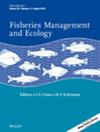Economic impact of resident and nonresident marine anglers to the local economy in Mecklenburg‐Western Pomerania, Germany
IF 2
3区 农林科学
Q2 FISHERIES
引用次数: 0
Abstract
Abstract Recreational fisheries catches are increasingly considered in the assessment and management of mixed recreational‐commercial marine fisheries, while the contribution of recreational fisheries to the economy is often overlooked. Using a telephone diary survey targeting marine recreational anglers in Germany, we estimated the number of anglers and their expenditures over the course of 1 year (2014–2015). About 197,000 marine anglers spent €248 million in Germany. We then constructed regional input–output models and contrasted the economic impacts of resident and nonresident anglers fishing in coastal and transitional brackish waters of the state of Mecklenburg‐Western Pomerania in north‐eastern Germany. On a regional scale, the total economic impact was €210 million supporting 2044 jobs, nonresident anglers were responsible for eight times greater economic impact than resident anglers. Maintaining attractive fishing opportunities for the recreational fishing sector, specifically angling tourism, is critical for maintaining resource flows to local and regional economies.德国梅克伦堡-西波美拉尼亚居民和非居民海洋垂钓者对当地经济的经济影响
摘要休闲渔业的渔获量在休闲-商业混合海洋渔业的评估和管理中越来越受到重视,而休闲渔业对经济的贡献往往被忽视。通过对德国海洋休闲垂钓者的电话日记调查,我们估计了1年(2014-2015年)期间垂钓者的数量及其支出。约有19.7万名海洋垂钓者在德国消费了2.48亿欧元。然后,我们构建了区域投入产出模型,并对比了德国东北部梅克伦堡-西波美拉尼亚州沿海和过渡咸淡水水域居民和非居民垂钓者捕鱼的经济影响。在区域范围内,总经济影响为2.1亿欧元,支持2044个工作岗位,非居民垂钓者的经济影响是居民垂钓者的8倍。为休闲捕鱼部门,特别是垂钓旅游,保持有吸引力的捕鱼机会,对于保持资源流向地方和区域经济至关重要。
本文章由计算机程序翻译,如有差异,请以英文原文为准。
求助全文
约1分钟内获得全文
求助全文
来源期刊

Fisheries Management and Ecology
农林科学-渔业
CiteScore
3.80
自引率
5.00%
发文量
77
审稿时长
12-24 weeks
期刊介绍:
Fisheries Management and Ecology is a journal with an international perspective. It presents papers that cover all aspects of the management, ecology and conservation of inland, estuarine and coastal fisheries.
The Journal aims to:
foster an understanding of the maintenance, development and management of the conditions under which fish populations and communities thrive, and how they and their habitat can be conserved and enhanced;
promote a thorough understanding of the dual nature of fisheries as valuable resources exploited for food, recreational and commercial purposes and as pivotal indicators of aquatic habitat quality and conservation status;
help fisheries managers focus upon policy, management, operational, conservation and ecological issues;
assist fisheries ecologists become more aware of the needs of managers for information, techniques, tools and concepts;
integrate ecological studies with all aspects of management;
ensure that the conservation of fisheries and their environments is a recurring theme in fisheries and aquatic management.
 求助内容:
求助内容: 应助结果提醒方式:
应助结果提醒方式:


